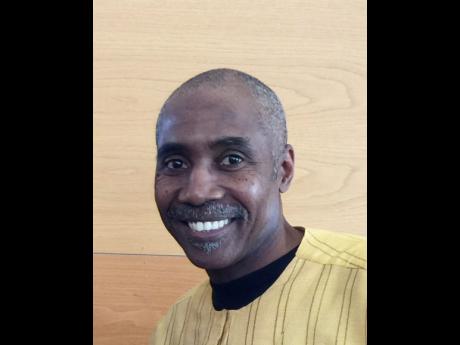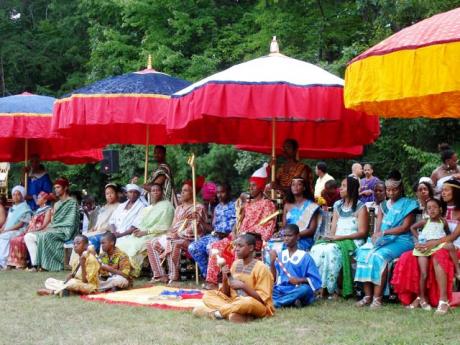Religion of the Pharaohs makes strong comeback
Dr Josef Ben-Jochanan was eulogised a few weeks ago as a trailblazer and influential figure in African history. His celebrated body of work includes African Origins of the Major Western Religions, and The Black Man's Religion: The Myth of Genesis and Exodus, and the exclusion of their African Origins.
Both spell out the curious similarities between the doctrinal and liturgical practices of mainstream religions with those of Ancient Egyptians. These literary works rattled conservative thought and fuelled pan-African consciousness. His comprehensive grasp of comparative religion, history, Semitic languages and the hieroglyphics made for a near bulletproof thesis.
Today, the echoes of Dr Ben-Jochanan resound in the teachings of the Ausarian religion. One of its many priests, Kokayi Sadiki, hails from Trinidad. A long-time researcher of ancient African history and Egyptology, Sadiki was introduced to the Ausar Auset Society during a visit to New York.
plans for Jamaica temple
Since its formation in 1973, the Ausarian religion is now practised in 25 cities in the United States and has chapters in the United Kingdom, Canada and South Africa. Plans are under way to establish a temple in Jamaica.
At the outset, Sadiki (known also by his religious name: Shekhem Bakhenti Nuramen) outlined the principles of faith. The religion holds that man is made in the image of God, and thus is a divine being with divine purpose in life. Although its core philosophy is framed in pan-African terms, Sadiki emphasised that its teaching are for all peoples, as reflected in the broad reach of the organisation's online programme.
The faithful cull their practices from the surviving literature of the ancient Egyptians, prising The Egyptian Book of the Dead: The Book of Coming Forth by Day and Night, known as The Ru Pert Em Heru. Credence is also given to The Book of Knowing, or The Evolution of Ra and the Overthrowing of Apep, The Papyrus of Ani, and The Book of Gates.
Sadiki detailed his religion's hierarchical structure and its ongoing programme that is currently preparing 143 initiates for priesthood under the guidance of the high priest Ra Un Nefer Amen.
This sacerdotal class is comprised of three levels or degrees of attainment. Interestingly, a graduation to these influential positions is not determined by a test or any secular process, but through the discernment of the elders and the use of oracles. One's maturity, wisdom and behaviour are keenly gauged.
Priests have the august responsibility of leading meditation sessions for members on Sundays and delivering lectures on esoteric lore. Individuals desirous of inclusion must prove their salt by assiduously attending workshops on hermetics, philosophy, divination, wellness, meditation and related disciplines.
According to Sadiki, the importance of the winter and summer solstices couldn't be overemphasised and are marked. The same holds true for spring and fall equinoxes.
In tandem with Dr Ben-Jochanan revolutionary work, members advance that every mainstream religion emerged out of ancient Egyptian, the very cradle of civilisation, and urge sceptics and truth seekers to study the seven-volume tome, Metu Neter.
This book is said to comprehensively prove the religious variants, subsets and distortions of Kemetic (Egyptian) teachings. The Trinity Concept, resurrection, soteriology and the Ten Commandments, and more, are rooted in the spiritual drama of these ancient people. Sadiki also traced the Yoruba and Hindu deities to Egypt's past.
Embrace truths
We are beckoned to embrace these truths and delve into the nature of our being. Only then will spiritual restoration and veritable peace be realised. Sadiki stressed that a violent world will always be part of the equation if we forgo some fundamental principles.
"Our thinking is flawed and we are moved by emotions," he asserted.
"We allow ourselves to be controlled by the instinctive, tribal and intellectual brain. We have not developed our pre-frontal cortex, wherein are rooted spirituality, compassion, love and morality. And regrettably, we are constantly assaulting this celestial part of being."
He argued that our essential, innate nature is peace, and that we can experience its perennial beauty through spiritual exercises and living in accordance with the eleven basic laws, some of which include, "understanding and acknowledging our divine nature; knowing our spirit is in charge of the realisation of all events - physiological and social; acknowledging our purpose and destiny; wanting for others what we want for ourselves, experiencing oneness with all life; and affirming that health, success and the treasures of spiritual life is attainable".
The Ausarian religion dismisses anthropomorphic depictions of God and of an arch-nemesis called Satan.
God, referred to as Neb-er-tcher, is sublime essence, an ineffable concept beyond mere human comprehension.
"The Devil," Sadiki explained, "is a negative manifestation that stems from within us. This nefarious figure is our whipping boy, culpable for our own transgressions and weaknesses. We have erred by creating a Saviour to fight the evil we have created."
And it follows that a key part of Ausarian philosophy is knowledge of "free will".
Our actions are in no way compelled by an external force. We hold the cards to our destiny. The tree of life is embedded in our consciousness and we are bestowed the inalienable right to choose our own path. In effect, the buck stops with us.
- Dr Glenville Ashby is the president of Global Interfaith CouncilFeedback: glenvilleashby@gmail.com or follow him on Twitter@glenvilleashby


